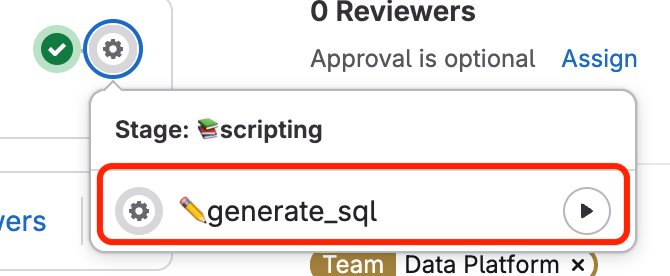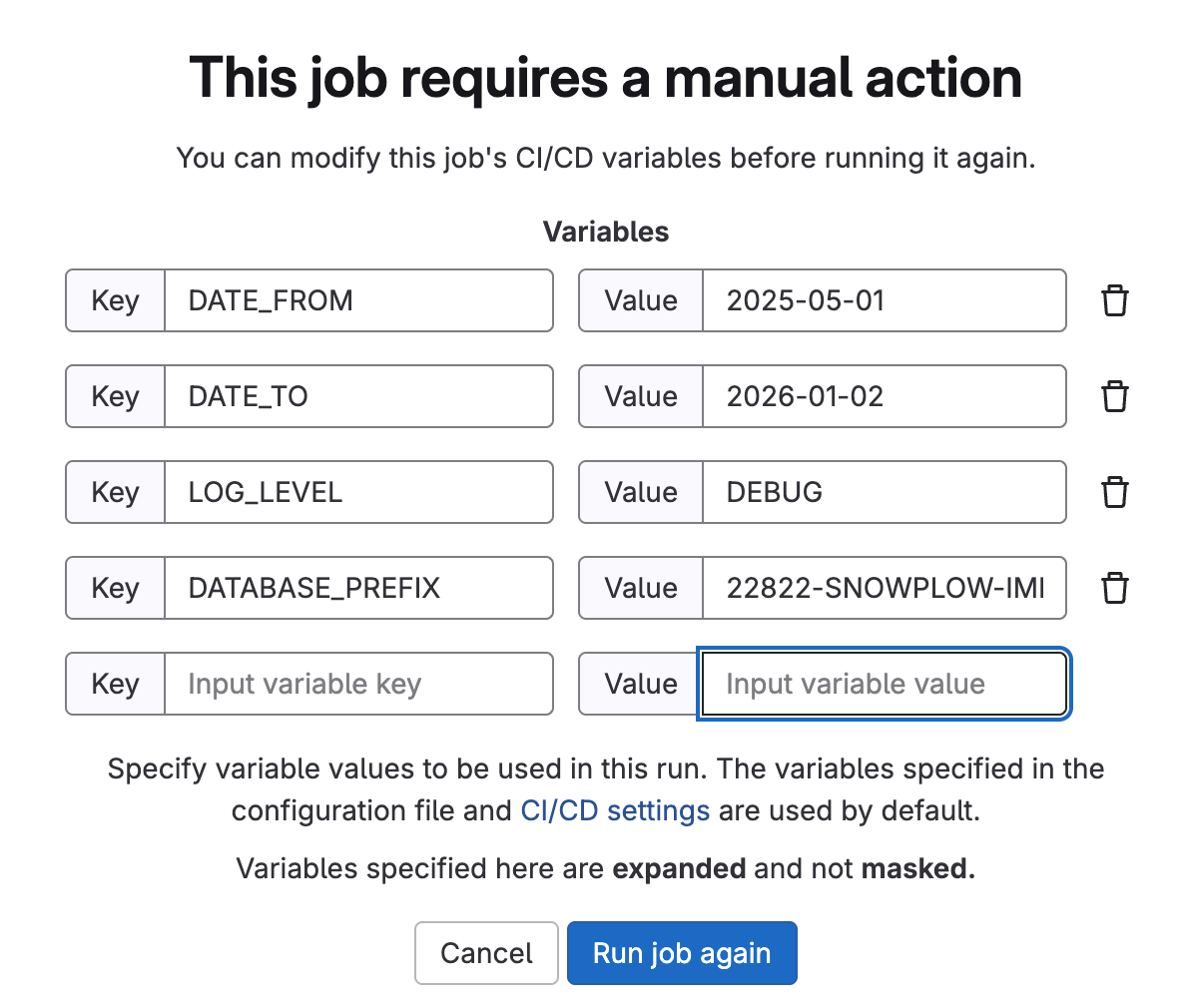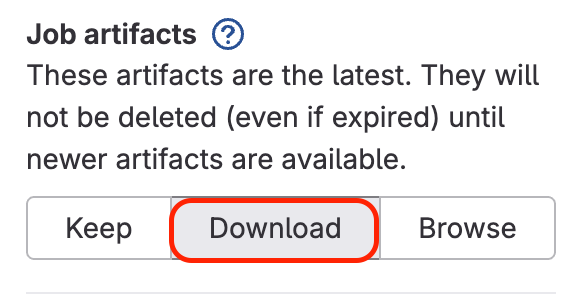Snowplow
Snowplow Overview
Snowplow is an open source, event analytics platform. There is a business entity that runs SaaS for Snowplow and they also maintain the code for the open source product. The general architecture overview of snowplow is on GitHub and has more detail on the basics of how it works and how it is set up.
In June of 2019, we switched sending Snowplow events from a third party to sending them to infrastructure managed by GitLab, documented on this page. From the perspective of the data team, not much changed from the third party implementation. Events are sent through the collector and enricher and dumped to S3.
As of December 2024, we have switched over to a new Snowplow env called aws-snowplow-prd, more information is detailed in the Snowplow internal handbook.
Snowplow - adding new app_id
When new application should be tracked by Snowplow here is the few things should be considered.

The right app_id, and collector URL should be done in coordination with the data team.
URL wil stay the same snowplowprd.trx.gitlab.net. Any app_id is fine if there are no other concerns around enabling tracking on CustomersPortal staging as well.
Note: Any un-expected events (with wrong app_id) are normally dropped.
The only model with app_id filtering is snowplow_base_events. That model flows downstream to the page view models:
flowchart LR SPBE[snowplow_base_events] --> SPWE[snowplow_web_events] SPWE --> snowplow_page_views snowplow_page_views --> common_prep.prep_snowplow_page_views_all common_prep.prep_snowplow_page_views_all --> common.fct_behaviour_website_page_views snowplow_page_views --> legacy.snowplow_page_views_*
In order to add a new app_id to snowplow_base_events (and downstream page view models), the snowplow:app_ids
variable in the dbt package must be updated. Those values are set in the dbt_project.yml
file. As an example, here is an issue to update the variable.
GitLab Implementation
The original design document to move our Snowplow infrastructure from a 3rd-party hosting service to 1st-part is documented in the Infrastructure design library. This was written before the build was started and contains many of the assumptions and design decisions.
Snowplow is built with Terraform on AWS documented in the config-mgmt project.
For a detailed walk-through of our setup, watch this GitLab Unfiltered internal video.

S3
Enriched events are stored in TSV format in the bucket s3://gitlab-com-snowplow-events/output/.
Bad events are stored as JSON in s3://gitlab-com-snowplow-events/enriched-bad/.
For both buckets, there are paths that follow a date format of /YYYY/MM/DD/HH/<data>.
Data Warehousing
Click to expand
Snowpipe
Once events are available in S3, we ingest them into the data warehouse using Snowpipe. This is a feature of our Snowflake Data Warehouse. An Amazon SQS event queue was set up for the good and bad event paths.
To run properly, Snowpipe needs a “stage” in Snowflake and a table to write to.
The good and bad S3 paths each have their own Stage within Snowflake.
These are named gitlab_events and gitlab_bad_events, respectively. They are owned by the LOADER role.
The create table statements for the good and bad events are as follows:
-- Good Events
CREATE OR REPLACE TABLE snowplow.gitlab_events
(
app_id VARCHAR,
platform VARCHAR,
etl_tstamp VARCHAR,
collector_tstamp VARCHAR,
dvce_created_tstamp VARCHAR,
event VARCHAR,
event_id VARCHAR,
txn_id VARCHAR,
name_tracker VARCHAR,
v_tracker VARCHAR,
v_collector VARCHAR,
v_etl VARCHAR,
user_id VARCHAR,
user_ipaddress VARCHAR,
user_fingerprint VARCHAR,
domain_userid VARCHAR,
domain_sessionidx VARCHAR,
network_userid VARCHAR,
geo_country VARCHAR,
geo_region VARCHAR,
geo_city VARCHAR,
geo_zipcode VARCHAR,
geo_latitude VARCHAR,
geo_longitude VARCHAR,
geo_region_name VARCHAR,
ip_isp VARCHAR,
ip_organization VARCHAR,
ip_domain VARCHAR,
ip_netspeed VARCHAR,
page_url VARCHAR,
page_title VARCHAR,
page_referrer VARCHAR,
page_urlscheme VARCHAR,
page_urlhost VARCHAR,
page_urlport VARCHAR,
page_urlpath VARCHAR,
page_urlquery VARCHAR,
page_urlfragment VARCHAR,
refr_urlscheme VARCHAR,
refr_urlhost VARCHAR,
refr_urlport VARCHAR,
refr_urlpath VARCHAR,
refr_urlquery VARCHAR,
refr_urlfragment VARCHAR,
refr_medium VARCHAR,
refr_source VARCHAR,
refr_term VARCHAR,
mkt_medium VARCHAR,
mkt_source VARCHAR,
mkt_term VARCHAR,
mkt_content VARCHAR,
mkt_campaign VARCHAR,
contexts VARCHAR,
se_category VARCHAR,
se_action VARCHAR,
se_label VARCHAR,
se_property VARCHAR,
se_value VARCHAR,
unstruct_event VARCHAR,
tr_orderid VARCHAR,
tr_affiliation VARCHAR,
tr_total VARCHAR,
tr_tax VARCHAR,
tr_shipping VARCHAR,
tr_city VARCHAR,
tr_state VARCHAR,
tr_country VARCHAR,
ti_orderid VARCHAR,
ti_sku VARCHAR,
ti_name VARCHAR,
ti_category VARCHAR,
ti_price VARCHAR,
ti_quantity VARCHAR,
pp_xoffset_min VARCHAR,
pp_xoffset_max VARCHAR,
pp_yoffset_min VARCHAR,
pp_yoffset_max VARCHAR,
useragent VARCHAR,
br_name VARCHAR,
br_family VARCHAR,
br_version VARCHAR,
br_type VARCHAR,
br_renderengine VARCHAR,
br_lang VARCHAR,
br_features_pdf VARCHAR,
br_features_flash VARCHAR,
br_features_java VARCHAR,
br_features_director VARCHAR,
br_features_quicktime VARCHAR,
br_features_realplayer VARCHAR,
br_features_windowsmedia VARCHAR,
br_features_gears VARCHAR,
br_features_silverlight VARCHAR,
br_cookies VARCHAR,
br_colordepth VARCHAR,
br_viewwidth VARCHAR,
br_viewheight VARCHAR,
os_name VARCHAR,
os_family VARCHAR,
os_manufacturer VARCHAR,
os_timezone VARCHAR,
dvce_type VARCHAR,
dvce_ismobile VARCHAR,
dvce_screenwidth VARCHAR,
dvce_screenheight VARCHAR,
doc_charset VARCHAR,
doc_width VARCHAR,
doc_height VARCHAR,
tr_currency VARCHAR,
tr_total_base VARCHAR,
tr_tax_base VARCHAR,
tr_shipping_base VARCHAR,
ti_currency VARCHAR,
ti_price_base VARCHAR,
base_currency VARCHAR,
geo_timezone VARCHAR,
mkt_clickid VARCHAR,
mkt_network VARCHAR,
etl_tags VARCHAR,
dvce_sent_tstamp VARCHAR,
refr_domain_userid VARCHAR,
refr_dvce_tstamp VARCHAR,
derived_contexts VARCHAR,
domain_sessionid VARCHAR,
derived_tstamp VARCHAR,
event_vendor VARCHAR,
event_name VARCHAR,
event_format VARCHAR,
event_version VARCHAR,
event_fingerprint VARCHAR,
true_tstamp VARCHAR,
uploaded_at TIMESTAMP_NTZ(9) DEFAULT CAST(CURRENT_TIMESTAMP() AS TIMESTAMP_NTZ(9))
)
-- Bad Events Table
CREATE OR REPLACE TABLE snowplow.gitlab_bad_events
(
jsontext VARIANT,
uploaded_at TIMESTAMP_NTZ(9) DEFAULT CAST(CURRENT_TIMESTAMP() AS TIMESTAMP_NTZ(9))
);
Since TSV is not as straight-forward as CSV, a custom file format was created with the following statement:
CREATE OR REPLACE FILE FORMAT snowplow_tsv TYPE = CSV FIELD_DELIMITER = '\t'
The actual pipe for good events was created using:
CREATE OR REPLACE PIPE raw.snowplow.gitlab_good_event_pipe auto_ingest= TRUE AS
COPY INTO raw.snowplow.gitlab_events
FROM (SELECT $1, $2, $3, $4, $5, $6, $7, $8, $9,$10,$11,$12,$13,$14,$15,$16,$17,$18,$19,$20,$21,$22,$23,$24,$25,$26,$27,$28,$29,$30,$31,$32,$33,$34,$35,$36,$37,$38,$39,$40,$41,$42,$43,$44,$45,$46,$47,$48,$49,$50,$51,$52,$53,$54,$55,$56,$57,$58,$59,$60,$61,$62,$63,$64,$65,$66,$67,$68,$69,$70,$71,$72,$73,$74,$75,$76,$77,$78,$79,$80,$81,$82,$83,$84,$85,$86,$87,$88,$89,$90,$91,$92,$93,$94,$95,$96,$97,$98,$99,100,101,102,103,104,105,106,107,108,109,110,111,112,113,114,115,116,117,118,119,120,121,122,123,124,125,126,127,128,129,130,131,CAST(CURRENT_TIMESTAMP() AS TIMESTAMP_NTZ(9)) AS uploaded_at
FROM @raw.snowplow.gitlab_events)
FILE_FORMAT = (FORMAT_NAME = 'snowplow_tsv')
ON_ERROR = 'skip_file';
This highlights the fact that JSON would be a better format. This could be a future iteration of the infrastructure.
The bad event pipe is created as follows:
CREATE OR REPLACE PIPE raw.snowplow.gitlab_bad_event_pipe auto_ingest= TRUE AS
COPY INTO raw.snowplow.gitlab_bad_events (jsontext)
FROM @raw.snowplow.gitlab_bad_events
FILE_FORMAT = (TYPE = 'JSON');
To view pipes:
SHOW PIPES IN raw.snowplow;
To describe a pipe:
DESCRIBE PIPE raw.snowplow.gitlab_good_event_pipe;
To pause a running pipe:
ALTER PIPE raw.snowplow.gitlab_good_event_pipe SET PIPE_EXECUTION_PAUSED = TRUE;
To force resume a pipe:
SELECT system$pipe_force_resume('raw.snowplow.gitlab_good_event_pipe');
To check the status of a pipe
SELECT system$pipe_status('raw.snowplow.gitlab_good_event_pipe');
To force a refresh of the stage so that snowpipe picks up older events:
ALTER PIPE gitlab_good_event_pipe refresh;
dbt
To materialize data from the RAW database to PROD for querying, we have implemented a partitioning strategy within dbt. By default, the snowplow models and the Fishtown snowplow package will write to a schema scoped to the current month in the PREP database. For July 2019, the schema would be snowplow_2019_07.
Within each monthly partition all of the base models and the models generated by the package are written for all events that have a derived timestamp that matches the partition date. Different monthly partitions can be generated by passing in variables to dbt at run time:
--vars '{"year": "2019", "month": "01", "part": "2019_01"}'
Some models downstream of the monthly partitions (ex. fct_behavior_structured_event and mart_behavior_structured_event) use the incremental_backfill_date variable to set the start and end for a backfill. This can be used locally to test backfilling a month of data by using the following variable at run time:
--vars '{"incremental_backfill_date":"{{dbt.string_literal(\"YYYY-MM-DD\")}}"}'
Backfills are done via Airflow. The dbt_snowplow_backfill DAG will generate a task for each month from July 2018 to the current month.
Do Not Track
Our snowplow tracking configuration and particular implementations respect the Do Not Track (DNT) headers whenever it’s present on a user’s browser.
Duo data redaction
We only keep Duo free form feedback for 60 days in snowflake. This is managed by the duo_data_redaction DAG, which runs daily, removing contents of the extendedFeedback attribute in the contexts column for all feedback response Snowplow events in RAW and PREP. This timeline allows for our full-refresh process to complete, updating all downstream data, within 90 days for compliance.
Snowplow improvement: SQL scripting for issue fixing
To generate a script the issue, do the following things:
-
Open an issue in the project snowplow-fix-scripting
-
Open an MR in the same project
-
Adjust
config.ymlfile to adjust your logic. -
Run the pipeline 📚scripting -> ✏️generate_sql in MR

Pipeline ✏️generate_sql
The ✏️generate_sql job is a manually triggered job in the GitLab CI/CD pipeline that generates SQL scripts based on provided parameters. It runs in the 📚scripting stage of the pipeline.
To run this job successfully, the following environment variables must be set:
- Required Environment Variables:
DATE_FROM: Start date for the data range to process in the formatYYYY-MM-DDDATE_TO: End date for the data range to process in the formatYYYY-MM-DD
- Optional Environment Variables
LOG_LEVEL: Sets the logging verbosity (defaults toDEBUGif not provided). Allowed values:[DEBUG|INFO|WARNING|ERROR|CRITICAL]DATABASE_PREFIX: Optional prefix for database objects or connections. If value is not provided, then PROD code is generated (RAW,PREP,PROD). Otherwise, enter prefix for the database name i.e.22822-SNOWPLOW-IMPROVEMENT-SQL-SCRIPTING-FOR-ISSUE-FIXING.

Output structure
scripts/
├──RAW
├────1_backup.sql # create backup
├────2_update.sql # fix script to update
├────3_check.sql # check script
├────4_drop.sql # drop backup script
├──PREP
├────1_backup.sql # create backup
├────2_update.sql # fix script to update
├────3_check.sql # check script
├────4_drop.sql # drop backup script
├──PROD
├────1_backup.sql # create backup
├────2_update.sql # fix script to update
├────3_check.sql # check script
├────4_drop.sql # drop backup script
Usually, the flow will require the pipeline to be executed twice (not necessarily), once to generate a testing script to be run on the dev DB’s, and once to generate a prod script to be run on the production db’s.
- For testing databases, the parameter
DATABASE_PREFIXwill have a value as a prefix of development databases (ie.22822-SNOWPLOW-IMPROVEMENT-SQL-SCRIPTING-FOR-ISSUE-FIXING) and the code will be generated like:
...
UPDATE "22822-SNOWPLOW-IMPROVEMENT-SQL-SCRIPTING-FOR-ISSUE-FIXING_PREP".SNOWPLOW_2025_01.SNOWPLOW_UNNESTED_EVENTS
SET page_url_path = update_procedure(p_userid=userid)
...
- For the production database, the parameter
DATABASE_PREFIXwill be skipped. Code will look like:
...
UPDATE PREP.SNOWPLOW_2025_01.SNOWPLOW_UNNESTED_EVENTS
SET page_url_path = update_procedure(p_userid=userid)
...
The scripts are generated as an artifact. Once the pipeline is complete, click the download button to retrieve them.

d61360df)
